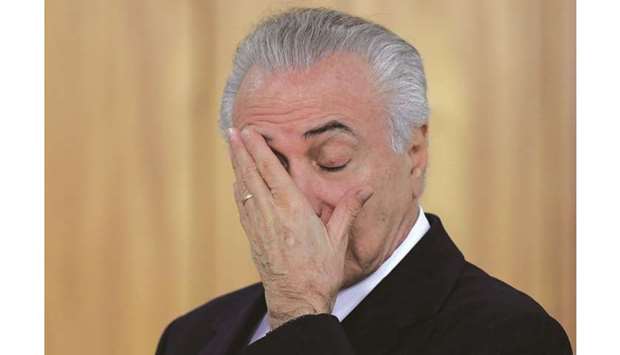Three months after political allies rescued him from a bribery case, Brazil’s President Michel Temer is facing his latest indictment with a strengthened hand.
The president appeared at ease Friday at an event in Rio de Janeiro — a day after Prosecutor General Rodrigo Janot charged him with leading a criminal group and obstructing justice in a huge kickbacks case rocking Brazil.
Temer made no reference to Thursday’s bombshell announcement, which could theoretically send him to prison.
Instead, he joked that his time in government was running out, having “maybe a year and a half more” before his term ends on January 1, 2019.
Janot — whose own term as Brazil’s top prosecutor ends today — fired a parting shot at the president on Thursday, filing charges that accused Temer of being the “leader of a criminal organisation” of political allies that took almost $190mn in kickbacks for awarding state contracts.
Two of the six political heavyweights charged along with Temer were his chief of staff Eliseu Padilha and close confidant Moreira Franco, who holds a ministerial level administrative post in the presidency.
He also accuses Temer of allegedly trying to bribe businessman Lucio Funaro, an alleged middleman in the scandal, to prevent him from turning state’s evidence in a plea deal with prosecutors.
Temer’s defence team has accused Janot of an obsessive desire to bring down the president, and the president’s office described the allegations as “pure magical realism”.
Janot had already charged Temer with bribe-taking in June but the case never went to trial, as the lower house of the legislature voted overwhelmingly to throw it out and prevent him from being tried in the Supreme Court.
“The president has already shown that he has sufficient support in the legislature to block the complaint and everything indicates that this support will be maintained,” Thomaz Favaro of consulting firm Control Risks told AFP.
The markets have paid little heed to the political furore, which has rising to record levels in recent months — buoyed by Temer’s reforms aimed at reeling in a runaway budget deficit, not to mention the legislature’s support for him in defeating the June indictment.
As Brazil begins to grapple successfully with recession, inflation is also easing, which has allowed the Central Bank to continue cutting interest rates.
All that despite only a five per cent approval rating for the Temer, who remains deeply unpopular with voters.
“Political instability has very negative effects on the economy and by Temer and his economic team continuing, it allows Brazil to recover its credibility,” Favaro said.
But the price of survival being demanded by his allies will be high.
“Temer managed to bury the first prosecution by buying his way to victory and he will have to do the same again,” said Sylvio Costa, who heads political website Congress in Focus.
He said Temer will have to allocate some 15bn reals ($4.8bn) “to free up resources for his allies among his political support base”.
The general feeling that Temer will survive was bolstered when his lawyers challenged plea-deal evidence by Joesely Batista, one half of a duo of brothers who run the world’s largest meatpacking company JBS.
The brothers added fuel to the fire consuming much of Brazil’s political class when they agreed to co-operate with prosecutors, after admitting their company had bribed nearly 2,000 politicians.
Joesely Batista said he had secretly recorded Temer allegedly discussing payment of hush money to prevent former allies testifying against him.
But Temer’s lawyers challenged the plea deal, along with much of the prosecution’s evidence, at the Supreme Court this week amid allegations that Batista withheld information from prosecutors.
Both Joesely and Wesley Batista had a leniency agreement cancelled and both were arrested.
Temer lawyers will argue that Janot’s accusations in the obstruction of justice case are flawed, being based on the discredited brothers’ confessions.
The Supreme Court will decide Wednesday whether that will invalidate their evidence.
The criminal charges must first be accepted by the court before being sent for debate in the lower house.
“This indictment is broader and more consistent than the first, but it is made by a prosecutor weakened by the problems that were caused by the JBS issue, while the government is celebrating positive economic data and has a majority,” said Costa.
“For this indictment to finish Temer off would require a popular mobilisation that right now does not exist.”

Brazil’s President Michel Temer (File Photo)


